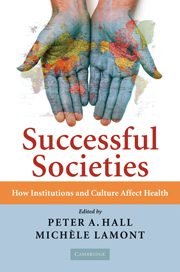Book contents
- Frontmatter
- Contents
- Contributors
- Preface
- Introduction
- 1 Population Health and the Dynamics of Collective Development
- 2 Social Interactions in Human Development: Pathways to Health and Capabilities
- 3 Health, Social Relations, and Public Policy
- 4 Population Health and Development: An Institutional-Cultural Approach to Capability Expansion
- 5 Responding to AIDS in Sub-Saharan Africa: Culture, Institutions, and Health
- 6 Responses to Racism, Health, and Social Inclusion as a Dimension of Successful Societies
- 7 Collective Imaginaries and Population Health: How Health Data Can Highlight Cultural History
- 8 Making Sense of Contagion: Citizenship Regimes and Public Health in Victorian England
- 9 The Multicultural Welfare State?
- 10 From State-Centrism to Neoliberalism: Macro-Historical Contexts of Population Health since World War II
- Bibliography
- Index
9 - The Multicultural Welfare State?
Published online by Cambridge University Press: 05 June 2012
- Frontmatter
- Contents
- Contributors
- Preface
- Introduction
- 1 Population Health and the Dynamics of Collective Development
- 2 Social Interactions in Human Development: Pathways to Health and Capabilities
- 3 Health, Social Relations, and Public Policy
- 4 Population Health and Development: An Institutional-Cultural Approach to Capability Expansion
- 5 Responding to AIDS in Sub-Saharan Africa: Culture, Institutions, and Health
- 6 Responses to Racism, Health, and Social Inclusion as a Dimension of Successful Societies
- 7 Collective Imaginaries and Population Health: How Health Data Can Highlight Cultural History
- 8 Making Sense of Contagion: Citizenship Regimes and Public Health in Victorian England
- 9 The Multicultural Welfare State?
- 10 From State-Centrism to Neoliberalism: Macro-Historical Contexts of Population Health since World War II
- Bibliography
- Index
Summary
INTRODUCTION
One of the most important challenges facing contemporary Western societies concerns increasing ethnocultural diversity. Three interrelated, big, slow-moving trends are dramatically transforming Western societies: (1) the increasing ethnic and racial heterogeneity of the population; (2) the increasing politicization of ethnocultural identities, and the rise of “identity politics” or “recognition politics”; and (3) partly in response to the first two trends, the increasing adoption of “multiculturalism” policies to accommodate politicized ethnocultural groups. In short, there are diversity-related changes in demographic composition, in political mobilization, and in public policies.
The implications of these trends for population health are potentially enormous. Studies often reveal significant inequalities in health outcomes across ethnic and racial groups, and even though the precise causal explanations remain debated, there is growing evidence for the importance of social factors, alongside more traditional genetic or economic explanations. Only a small fraction of these variations are explained by differences in gene frequency across groups, such as the greater genetic disposition of Ashkenazi Jews toward Tay-Sachs disease or of Caucasian people with light skin pigmentation toward melanoma. These disease-specific genetic idiosyncrasies – which are as likely to affect dominant groups as subordinate ones – do not explain the tendency of ethnic and racial minorities to have worse health across a broad range of illnesses.
- Type
- Chapter
- Information
- Successful SocietiesHow Institutions and Culture Affect Health, pp. 226 - 253Publisher: Cambridge University PressPrint publication year: 2009
- 6
- Cited by

